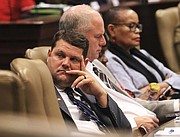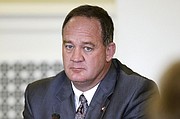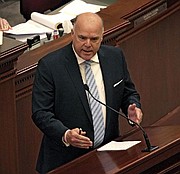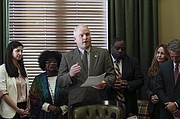Arkansas' 92nd General Assembly batted .500 on ethics legislation this year, enacting three of six bills in a package that legislative leaders from both parties signaled support for more than two months ago.
Legislative leaders released their ethics package at a news conference at the state Capitol on Feb. 4, in the aftermath of five former lawmakers being convicted or pleading guilty to federal crimes during the past 2½ years. Two former lawmakers face federal charges.
The other three bills in the package didn't make it out of committee and are essentially dead. After meeting for 87 days, the General Assembly recessed its regular session Wednesday for a two-week break with plans to return April 24 before officially adjourning the session. During the regular session, the Legislature also passed some ethics-related bills that weren't part of the package.
The three new ethics laws will take effect 90 days after the Legislature adjourns.
They are:
• Act 341, which will increase, from $2,000 to $3,500, the maximum fine that the Arkansas Ethics Commission can issue for an ethics violation.
[RELATED: Complete Democrat-Gazette coverage of the Arkansas Legislature]
According to its website, the commission serves as the compliance and enforcement agency under Arkansas' standards of conduct and disclosure laws concerning candidates for public office, state and local public officials, lobbyists and committees, and individuals involved with initiatives, referendums and other matters referred to the voters.
Current law allows the commission to assess fines of $50 to $2,000 and/or issue public letters of caution, reprimand and warning for ethics violations.
Senate President Pro Tempore Jim Hendren, R-Sulphur Springs, sponsored Senate Bill 249 that became Act 341.
• Act 879, which will increase the penalties for taking campaign funds exceeding certain levels and using them as personal income. The current charge is a Class A misdemeanor regardless of the amount.
Under the act, knowingly taking campaign funds as personal income if the value is at least $25,000 would be a Class B felony; at least $5,000 but less than $25,000 would be a Class C felony; at least $2,500 but less than $5,000 would be Class D felony; and less than $2,500 would be a Class A misdemeanor.
Sen. Will Bond, D-Little Rock, sponsored Senate Bill 258 that became Act 879.
• Act 342, which will prohibit state constitutional officers and state lawmakers from, while in that role, registering as lobbyists in Arkansas and any other jurisdiction. Arkansas law already bars state lawmakers from registering as lobbyists.
Senate Democratic leader Keith Ingram of West Memphis sponsored Senate Bill 256 that became Act 342.
FAILED BILLS
The three ethics bills that didn't clear legislative committees are:
• Senate Bill 238 by Sen. Mark Johnson, R-Little Rock, which would have required the forfeiture of retirement benefits of any state lawmaker or constitutional officer convicted of a felony arising out of abuse of public trust, abuse of office or fraud.
Johnson presented his bill to the Joint Committee on Public Retirement and Social Security Programs last month before he agreed to amend it, after Ingram said Johnson's version of the bill wasn't the one that legislative leaders had agreed to support.
• Senate Bill 259 by Senate Republican leader Bart Hester of Cave Springs, which would have barred state elected officials and members of the citizens commission that sets the salaries of state elected officials from having more than one political action committee.
Hester said he didn't present the bill to the Senate State Agencies and Governmental Affairs Committee, of which he is a member.
• Senate Bill 260 by Hester, which would have prohibited direct contributions from one political action committee to another political action committee. Hester said he didn't present that bill either to the Senate State Agencies committee.
'MADE PROGRESS'
In another ethics-related matter, Hendren received the Legislature's approval for increasing the appropriation for the Ethics Commission to meet its request for two more employees and increasing its operating budget and salaries. Senate Bill 49 is now Act 191.
"We made progress," Hendren said Thursday. "We can always make more progress."
"I think just as we found when we started reviewing and revising the [Senate's ethics] rules, it is complicated and it is very easy to catch good people making innocent mistakes if you are not careful about how you write rules and even more careful about how you write legislation, so obviously I would have liked to have seen all six passed," he said in an interview. "But the fact that we got half of them passed is a step in the right direction, but it means we still have more work to do."
(On Thursday, Hendren's cousin, former state Sen. Jeremy Hutchinson, a Republican from Little Rock, was charged in a federal case that accuses him of accepting bribes from a behavioral health provider. Last fall, Jeremy Hutchinson was indicted in an unrelated federal case that accuses him of wire and tax fraud. He has pleaded innocent to charges in both cases. Hendren and the former senator are nephews of Gov. Asa Hutchinson.)
On the legislative ethics proposals, House Speaker Matthew Shepherd, R-El Dorado, said Thursday, "On the House end, everything that came to us we passed. I don't know as far as the ones that didn't make it down there.
"As far as all the ins and the outs down there, I didn't get involved in their discussions once the bills were filed, so I couldn't really speak to the specifics. I think it is just reflective of the fact that as with a lot of issues, it can take time. Of course, one of the things I have always said is I want to be careful about how we do things because we don't want to do something as a kind of knee-jerk reaction to one thing and end up creating additional problems or not really solving the problem," Shepherd said.
'DIDN'T WORK OUT'
Johnson said he's "kind of upset" that he wasn't able to get SB238, the bill to cut retirement benefits of elected officials convicted of certain felonies, out of the retirement committee.
He said it took "forever" to get actuarial studies for the bill, plus committee actuary Jody Carreiro was skeptical that the bill complied with federal law.
"Our research showed it was constitutional," Johnson said.
SB238 was amended Feb. 20, March 13 and April 2, according to the General Assembly's website.
"It just didn't work out, trying to please everybody. We just ran out of time," Johnson said. "I realize it is not as easy as I thought it would be, and a lot of that is due to the actuarial involvement."
On March 25, Johnson couldn't get a motion from any of the committee's 20 members for SB52, which is a bill similar to SB238 and applies to public employees. Carreiro had told the committee, "Our primary concern is that any forfeiture of retirement benefits can at times conflict with federal retirement law. ... There are ways for the courts to work with the systems to attach the assets once they come out of the plans, and, according to the systems, it happens now."
Assistant Attorney General Daniel Faulkner told the committee, "We'll defend anything that is passed. But I do agree that Mr. Carreiro has some valid concerns."
HESTER'S BILLS
Meanwhile, Hester said he didn't present his two bills to the Senate State Agencies committee, on which he serves, because he didn't have time to meet with people who had concerns.
"I wouldn't say I had opposition [to them]. I just had organizations, groups, members that all said, 'Before you run them, I wanted to meet with you,' and I felt like when somebody asked for that meeting, I should do it, and it just became like I just didn't have the time to have all the meetings, so I just didn't pursue it," he said. "I made the decision about a week and a half out."
"Most people were like, 'I am not opposed to it ... just look at changing one thing. Can I just meet with you over that?' So I just never did it," he said.
Brenda Vassaur Taylor, co-founder of the conservative group Conduit for Action, said in an email to this newspaper that SB259 -- Hester's proposal to bar state elected officials from having more than one political action committee -- "in my opinion is simply a 'look over here' attempt by members in the Senate to appear to be doing something regarding 'ethics.'"
SB260 -- the bill to bar a political action committee from contributing to another PAC -- "was another such attempt," Vassaur Taylor wrote in an email. "Bills or laws such as these will only add to the difficulty of the average citizen being involved and making any real difference in the Arkansas political system."
Some State Agencies committee members -- Sens. Bond; Breanne Davis, R-Russellville; and Bob Ballinger, R-Berryville -- said they didn't hear from opponents to Hester's two bills. Ballinger was a co-sponsor of the two bills.
Sen. Trent Garner, R-El Dorado, said he had reservations about the legislation.
Another committee member, Sen. Jimmy Hickey, R-Texarkana, said in an email to this newspaper, "I just looked these up. They look like Hester/Ballinger bills. I don't know anything about them."
Sen. Bill Sample, who serves on the committee, said in an email to this newspaper that "apparently Hester got cold feet and never ran them. I don't recall any conversation about either one."
Committee chairman Ron Caldwell, R-Wynne, said in an email to this newspaper that he "never had any discussion on either bill. Never heard anyone talk about running either bill. Apparently filed the bills and let them lay."
BANNED FROM OFFICE
Hester did win approval of his Senate Bill 650, which would prohibit a person convicted of a public trust crime -- an act prohibited under Article 5, Section 9, of the Arkansas Constitution -- from running as a candidate for state office or holding a state office.
Under Article 5, Section 9, "No person hereafter convicted of embezzlement of public money, bribery, forgery or other infamous crime, shall be eligible to the General Assembly or capable of holding any office of trust or profit in this State."
SB650 also would specify that the sealing of any such crime or similar offense under the Comprehensive Criminal Record Sealing Act of 2013 or any sealing or expungement act in any jurisdiction wouldn't restore the convicted person's eligibility or qualification to file or run as a candidate or hold office. SB650 is now Act 894, said the governor's spokesman, J.R. Davis.
Hester said a friend suggested the bill, and he is unaware that it's aimed at anybody in particular.
NO BILL ON LOANS
Last September, Shepherd told this newspaper that he had asked the legislative staff to "bring to me either legislation or possibly a rule to prohibit loans among legislators."
House Revenue and Taxation Committee chairman Joe Jett, R-Success, had acknowledged lending $16,000 to then-House Speaker Jeremy Gillam, R-Judsonia, in the fall of 2016 to help Gillam's financially struggling farm.
The loan was made before Jett switched from the Democratic Party to the Republican Party in 2016 and before Gillam reappointed Jett as chairman of the House tax committee in January 2017. Gillam, who resigned from the House in June to become the University of Central Arkansas' director of governmental affairs, said he paid back the loan by the end of last year.
Last September, Hendren said he also planned to ask the Senate ethics committee to study loans among lawmakers, after he acknowledged advancing in 2014 what he believed was roughly $4,000 to then-Senate Revenue and Taxation Committee chairman Jake Files, R-Fort Smith. The loan was to help Files cover some checks when Hendren was Senate Republican leader. Hendren has said he had since written off the loan as a gift.
State law requires loans of more than $5,000 between lawmakers to be disclosed.
Asked whether legislative leaders have concluded that the law is sufficient, Hendren said Thursday, "I think that's necessary. I think if you take a loan from a legislator of a significant amount, it is fair that it be disclosed.
"We really didn't spend a lot of time discussing it in the midst of the session," he said. "We may come back and revisit it. I think there was a pretty good consensus that particularly loans between leadership and members is something that ought to be perhaps prohibited, but even that gets somewhat complicated."
Shepherd also was asked whether the current disclosure requirement is sufficient. The speaker said Thursday "that should provide the transparency that I think is at least a baseline for us in terms of the issue. ... I'm glad that is in place."
"But it is something that I want to look at more and I'm hopeful we can find some common ground on."
SundayMonday on 04/14/2019








